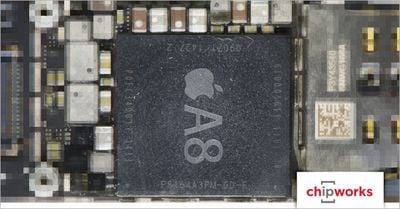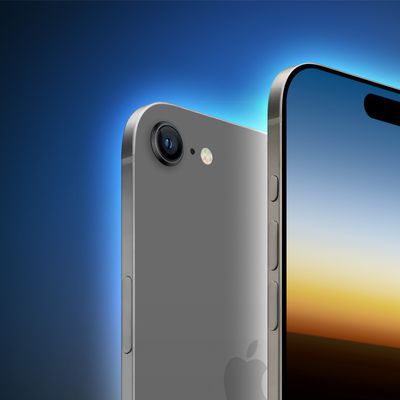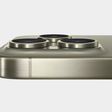iPhone 6 and 6 Plus Use 20-Nanometer A8 Processor From TSMC
Apple's 20-nanometer A8 processor in the new iPhone 6 and 6 Plus was fabricated by Taiwan Semiconductor Manufacturing Company (TSMC), according to Chipworks (via iFixit). Chipworks has been analyzing the various parts in the iPhone 6 and the iPhone 6 plus following its release today.
While the iPhone 5s used a 28-nanometer processor, the iPhone 6 and the 6 Plus have a 20-nanometer processor, as has been widely rumored. According to TSMC, its 20-nanometer process technology can result in speeds that are much higher than its 28-nanometer chips. The 20-nanometer process also results in a physically smaller chip that draws less power.

Ahead of the launch of the iPhone 6 and 6 Plus, there were multiple back and forth rumors that made it unclear whether Samsung or TSMC was manufacturing the chips destined for the new iPhones. Previous generation chips, such as the A7 in the iPhone 5s, were manufactured by Samsung, but Apple reportedly entered into a partnership with TSMC in an effort to reduce its reliance on rival Samsung. The shift is also part of a larger effort by Apple to diversify its supply chain, which cuts down on potential manufacturing issues.
Though TSMC created the 20-nanometer chips for the iPhone 6 and the 6 Plus, rumors have suggested that Apple hasn't ended its relationship with Samsung entirely. The company is rumored to be producing the 14-nanometer chips that will be used in future iOS devices next year, indicating that Apple has plans to continue having both TSMC and Samsung create chips for its devices.
According to Apple, the A8 chip in the iPhone 6 and 6 Plus offers a 25 percent faster CPU and 50 percent better graphics performance compared to the A7 in the iPhone 5s.
Popular Stories
Apple typically releases its new iPhone series in the fall, and a possible September 10 announcement date has been floated this year, which means we are just one month away from the launch of the iPhone 16. Like the iPhone 15 series, this year's lineup is expected to stick with four models – iPhone 16, iPhone 16 Plus, iPhone 16 Pro, and iPhone 16 Pro Max – although there are plenty of design...
Apple's M3 MacBook Pro is seeing multiple high value discounts on Best Buy and Amazon today, with up to $1,000 off select models. This includes a new all-time low price on the entry-level M3 512GB 14-inch MacBook Pro at $1,299.00, down from $1,599.00, and a massive $1,000 discount on the high-end 16-inch model exclusively for Best Buy members. Note: MacRumors is an affiliate partner with Best...
Multiple rumors have suggested that the iPhone 16 models are going to have an all-new button that's designed to make it easier to capture photos when the devices are held in landscape mode. Apple calls the button the Capture Button internally, and it is going to be one of the most advanced buttons that's been introduced to date with support for multiple gestures and the ability to respond to ...
Apple is beta testing iOS 18 and the first update to iOS 18 concurrently, and we got the second betas of iOS 18.1, iPadOS 18.1, and macOS Sequoia 15.1 today alongside the sixth betas of iOS 18, iPadOS 18, and macOS Sequoia 15. Many of the changes in iOS 18.1 are focused on bringing the .1 betas in line with the standard betas, which recently received updates to Photos and Safari, while...
Apple's iPhone development roadmap runs several years into the future and the company is continually working with suppliers on several successive iPhone models simultaneously, which is why we sometimes get rumored feature leaks so far ahead of launch. The iPhone 17 series is no different – already we have some idea of what to expect from Apple's 2025 smartphone lineup. If you plan to skip...
Apple's rumored iPhone 17 "Slim" could be positioned as an iPhone "Air" to boost sales, according to Bloomberg's Mark Gurman. In the latest edition of his "Power On" newsletter, Gurman explained how the "fourth" model in the iPhone lineup since 2020 (the iPhone 12 mini, iPhone 13 mini, iPhone 14 Plus, and iPhone 15 Plus) has largely been a commercial failure. In the case of the Plus model,...





















